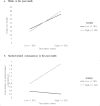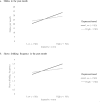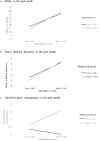Poor mental health, peer drinking norms, and alcohol risk in a social network of first-year college students
- PMID: 29684764
- PMCID: PMC5975188
- DOI: 10.1016/j.addbeh.2018.04.012
Poor mental health, peer drinking norms, and alcohol risk in a social network of first-year college students
Abstract
Objective: College students with anxiety and depressive symptomatology face escalated risk for alcohol-related negative consequences. While it is well-established that normative perceptions of proximal peers' drinking behaviors influence students' own drinking behaviors, it is not clear how mental health status impacts this association. In the current study, we examined cross-sectional relationships between anxiety and depressed mood, perceived drinking behaviors and attitudes of important peers, and past month alcohol consumption and related problems in a first-semester college student social network.
Method: Participants (N = 1254, 55% female, 47% non-Hispanic White) were first-year students residing on campus at a single university who completed a web-based survey assessing alcohol use, mental health, and social connections among first-year student peers. Network autocorrelation models were used to examine the independent and interactive associations between mental health and perceptions of close peers' drinking on drinking outcomes, controlling for important variables.
Results: Mental health interacted with perceptions to predict past-month drinking outcomes, such that higher anxiety and higher perceptions that peers drink heavily was associated with more drinks consumed and consequences, and higher depression and perceptions was associated with more drinks consumed, heavy drinking frequency, and consequences. Attitudes that peers approve of heavy drinking were associated with more drinks consumed and heavy drinking frequency among students with lower (vs. higher) depressed mood.
Conclusions: This study provides strong evidence that perceiving that close peers drink heavily is particularly risk-enhancing for anxious and depressed college students, and offers implications about alcohol intervention targeted at these subgroups.
Trial registration: ClinicalTrials.gov NCT02895984.
Keywords: Alcohol; Anxiety; College peers; Depressed mood; Perceptions; Social network.
Copyright © 2018 Elsevier Ltd. All rights reserved.
Conflict of interest statement
There are no conflicts of interest to report.
Figures



Similar articles
-
Relationships between social network characteristics, alcohol use, and alcohol-related consequences in a large network of first-year college students: How do peer drinking norms fit in?Psychol Addict Behav. 2018 Dec;32(8):914-921. doi: 10.1037/adb0000402. Epub 2018 Sep 27. Psychol Addict Behav. 2018. PMID: 30265059 Free PMC article.
-
Resistance to peer influence moderates the relationship between perceived (but not actual) peer norms and binge drinking in a college student social network.Addict Behav. 2018 May;80:47-52. doi: 10.1016/j.addbeh.2017.12.020. Epub 2017 Dec 20. Addict Behav. 2018. PMID: 29331611 Free PMC article.
-
Do misperceptions of peer drinking influence personal drinking behavior? Results from a complete social network of first-year college students.Psychol Addict Behav. 2019 May;33(3):297-303. doi: 10.1037/adb0000455. Epub 2019 Mar 14. Psychol Addict Behav. 2019. PMID: 30869918 Free PMC article.
-
Drinking Over the Lifespan: Focus on College Ages.Alcohol Res. 2016;38(1):103-14. Alcohol Res. 2016. PMID: 27159817 Free PMC article. Review.
-
The Epidemiology of Binge Drinking Among College-Age Individuals in the United States.Alcohol Res. 2018;39(1):23-30. Alcohol Res. 2018. PMID: 30557145 Free PMC article. Review.
Cited by
-
Daily stress predicts later drinking initiation via craving in heavier social drinkers: A prospective in-field daily diary study.J Psychopathol Clin Sci. 2022 Oct;131(7):780-792. doi: 10.1037/abn0000771. Epub 2022 Sep 1. J Psychopathol Clin Sci. 2022. PMID: 36048091 Free PMC article.
-
COVID-19 Racism, Depressive Symptoms, Drinking to Cope Motives, and Alcohol Use Severity Among Asian American Emerging Adults.Emerg Adulthood. 2022 Dec;10(6):1591-1601. doi: 10.1177/21676968221117421. Emerg Adulthood. 2022. PMID: 38603255 Free PMC article.
-
U.S. College Students' Social Network Characteristics and Perceived Social Exclusion: A Comparison Between Drinkers and Nondrinkers Based on Past-Month Alcohol Use.J Stud Alcohol Drugs. 2018 Nov;79(6):862-867. doi: 10.15288/jsad.2018.79.862. J Stud Alcohol Drugs. 2018. PMID: 30573016 Free PMC article.
-
College students' sense of belonging in times of disruption: Prospective changes from before to during the COVID-19 pandemic.High Educ Res Dev. 2023;42(6):1309-1322. doi: 10.1080/07294360.2022.2138275. Epub 2022 Nov 7. High Educ Res Dev. 2023. PMID: 37457647 Free PMC article.
-
The association between social network members sharing alcohol-related social media content and alcohol outcomes among college student drinkers.Alcohol Clin Exp Res. 2022 Aug;46(8):1592-1602. doi: 10.1111/acer.14899. Epub 2022 Jul 15. Alcohol Clin Exp Res. 2022. PMID: 35778778 Free PMC article.
References
-
- ACHA. American College Health Association-National College Health Assessment II: Undergraduate Student Reference Group Executive Summary Fall 2016. Hanover, MD: 2017. Retrieved from.
-
- Anselin L. Spatial Econometrics: Methods and ModelsKluwer Academic. Boston, MA: 1988.
Publication types
MeSH terms
Associated data
Grants and funding
LinkOut - more resources
Full Text Sources
Other Literature Sources
Medical
Miscellaneous

